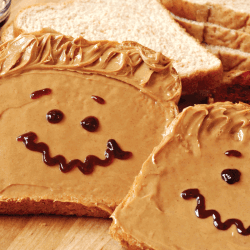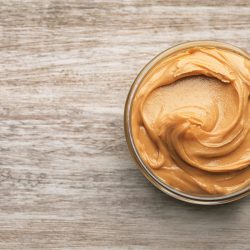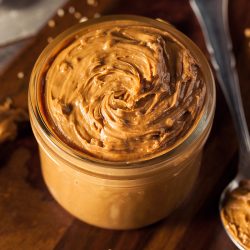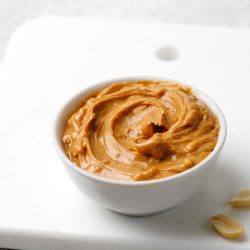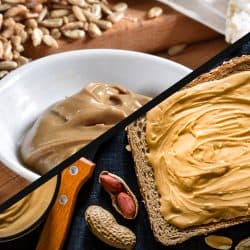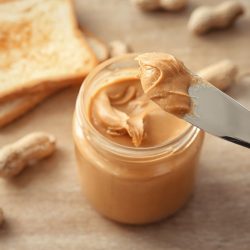Peanut butter is no different than any food; it needs to be stored properly. But what is considered proper storage for peanut butter? Can it be in the heat without spoiling? Let's take a look at how to store peanut butter and the signs that it has gone bad.
If peanut butter isn't stored in a cool, dry place and is exposed to heat, it can start to spoil. Peanut butter can go rancid (foul smell) and develop mold if it's stored in direct sunlight or is left out above room temperature for too long. Depending on the type of peanut butter, it either needs to be stored in a refrigerator or a cool, dry place such as a cupboard.
A majority of the time, food waste is caused by improper storage. That's why in this article, we will discuss how to properly store a jar of peanut butter. In addition, we will answer other frequently asked questions about peanut butter, so read on!
![Glass jar with creamy peanut butter on wooden table, Can Peanut Butter Go Bad In Heat? [Yes! Here's How To Tell If It's Spoiled!]](https://kitchenseer.com/wp-content/uploads/2022/10/Can-Peanut-Butter-Go-Bad-In-Heat-Yes-Heres-How-To-Tell-If-Its-Spoiled.jpg)
How Do You Properly Store Peanut Butter So It Doesn't Go Bad?
There are different types of peanut butter on the market. The main two types are natural peanut butter and processed peanut butter.
Natural peanut butter is made with only peanuts and sometimes salt. There are no added oils or preservatives, which means this type of peanut butter can go bad more quickly than processed types. Natural peanut butter should be stored in the fridge once it's open.
This will help to prevent mold and bacteria from growing. If you don't want to store your natural peanut butter in the fridge, make sure to keep it in a cool, dry place away from direct sunlight.
Processed peanut butter has added oils and preservatives, which help to extend its shelf life. Once opened, processed peanut butter can be stored at room temperature in a cool, dry place. If you live in a hot climate with no air conditioning, it's best to store processed peanut butter in the fridge.
To extend the shelf life of your peanut butter, make sure the lid is tightly sealed after each use. This will help to keep out oxygen and moisture, which can cause mold and bacteria growth.
When peanut butter is exposed to temperatures higher than room temperature, the oils can start to separate from the solids. This will cause the peanut butter to become runny and lose its flavor.
Over time, the fat will become rancid, producing an unpleasant smell. If your peanut butter has become runny or has an off smell, it's best to discard it.
Can I Leave Peanut Butter In A Hot Car?
As mentioned, peanut butter in the heat for an extended period of time will cause the oils to separate and can make the peanut butter go bad. Bacteria will grow rapidly in a hot car, so it's best to keep peanut butter (and all other food items) out of a hot car.
With that said, anything over two hours in a hot car is considered unsafe. If you leave your peanut butter in a hot car for an extended period of time, it's best to discard it.
The same goes for leaving any food item in direct sunlight. The heat will cause the food to spoil more quickly, so it's best to keep peanut butter and other food items out of direct sunlight.
How Long Does Peanut Butter Last?
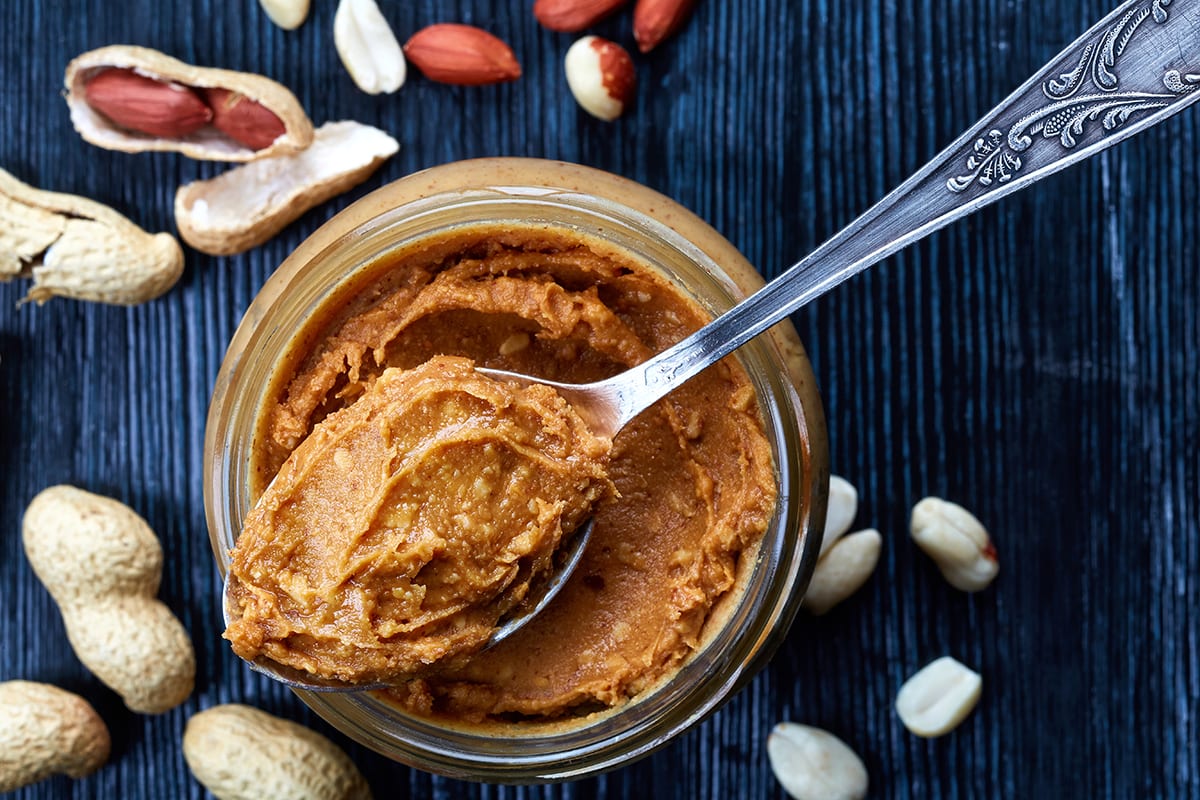
As we mentioned, there are two main types of peanut butter: natural and processed. The type of peanut butter you have will determine how long it will last.
Natural peanut butter has a shorter shelf life than processed peanut butter because it doesn't contain any preservatives. When natural peanut butter is unopened, it can be stored in a cool dark place for three months or more. However, once it's opened, it may only last a month before going rancid.
Now, if you put that same unopened jar of natural peanut butter in the fridge, it could last for a year or more. Once opened, it should still last several months stored in the fridge.
Processed peanut butter has a longer shelf life than natural peanut butter because it contains preservatives. When unopened, processed peanut butter can be stored in a cool dark place for up to six months or more.
Once opened, it can be stored at room temperature for up to two to three months. If you store processed peanut butter in the fridge after opening, it can last for up to nine months.
If your processed peanut butter is nearing the two-to-three-month mark and you notice the oils starting to separate, you can give it a good stir. Then, put it in the fridge to extend its shelf life by a few months.
Can You Get Food Poisoning From Peanut Butter?
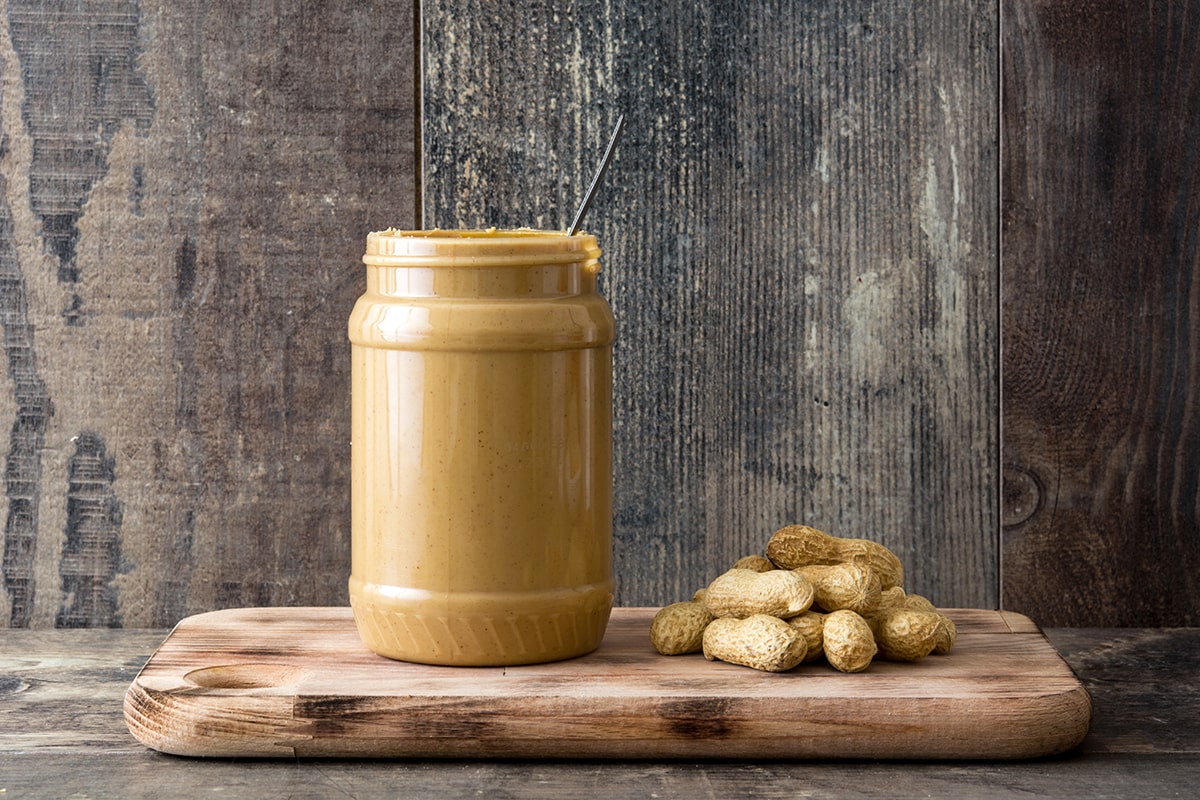
With any spoiled food, there is a risk of food poisoning. However, the risk is higher with certain foods than with others.
Nonetheless, spoiled peanut butter can develop mold, which can produce mycotoxins. These mycotoxins can lead to food poisoning if consumed in large enough quantities. The symptoms of food poisoning can include nausea, vomiting, and diarrhea.
In addition, peanut butter can be contaminated with salmonella, which is a type of bacteria that can cause food poisoning. The symptoms of salmonella poisoning include fever, diarrhea, and abdominal cramps.
If you experience any of these symptoms after eating peanut butter, it's best to see a doctor.
Can You Freeze Peanut Butter?
Another way to extend the life of your peanut butter is to freeze it. Peanut butter can be frozen for up to six months. After the six-month mark, the peanut butter will start to lose its flavor.
When freezing peanut butter, make sure it's in an airtight container. This will help to keep out moisture and prevent freezer burn. You can also freeze peanut butter in the original packaging, but make sure to remove any excess air before sealing it shut.
To thaw frozen peanut butter, simply place it in the fridge overnight. You can also set it out at room temperature for a few hours. Once thawed, give it a good stir before using.
If you buy peanut butter in bulk or have a jar nearing its expiration date, freezing it is a great way to extend its shelf life.
Is It Okay To Eat Expired Peanut Butter?
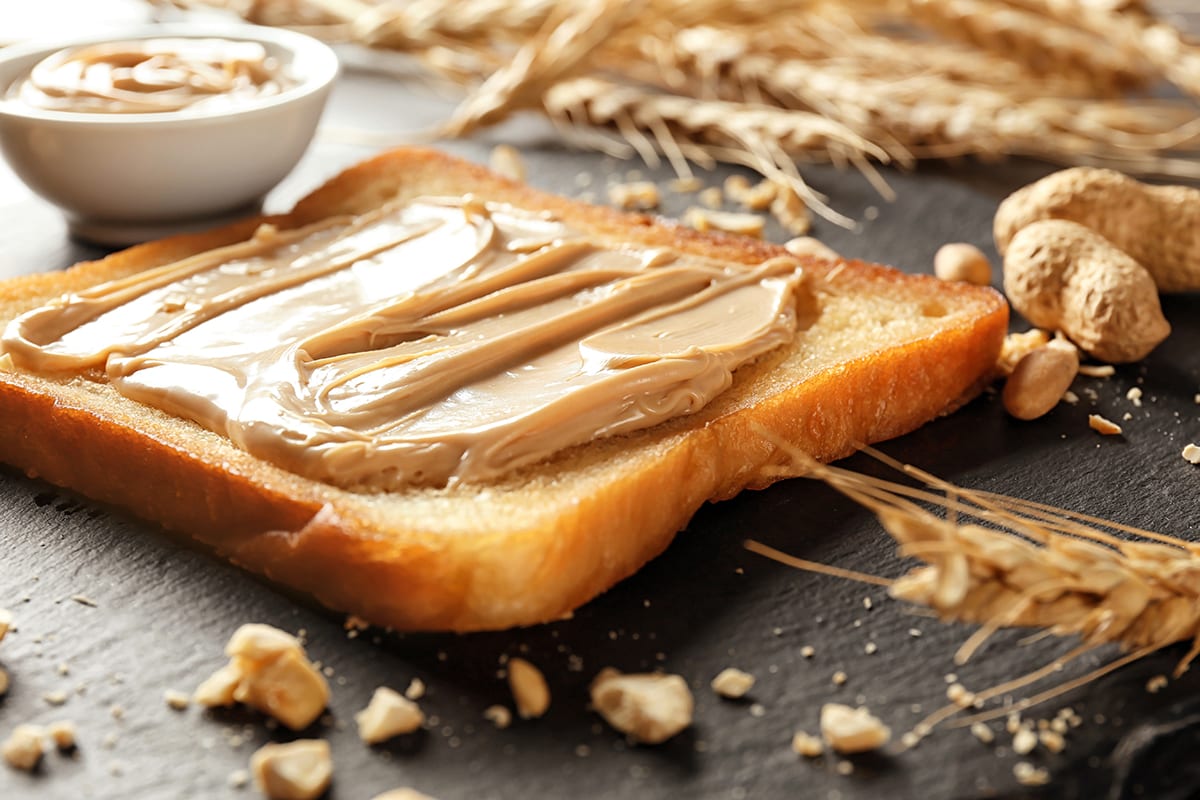
While peanut butter that's past its expiration date won't necessarily make you sick, it will probably taste bad. The flavor will become more intense, and the peanut butter will harden and become difficult to spread.
If your peanut butter has expired, it's best to throw it out. However, if you're in a pinch and don't have any other options, you can try eating it. Just be aware that it probably won't taste great.
However, if you notice any signs of mold or spoilage, it's best to throw the peanut butter out.
Should You Stir Peanut Butter Before Each Use?
Depending on the type of peanut butter, you may or may not need to stir it before each use. As mentioned, natural peanut butter will separate over time, and you'll need to give it a good stir before using it. You can also put your natural peanut butter upside down to help prevent this separation.
Processed peanut butter, on the other hand, is less likely to separate. You can still stir it if you want, but you don't necessarily need to.
If your peanut butter has been in the fridge, you'll probably need to give it a good stir before using it, regardless of the type. This is because the oils will have solidified and will need to be mixed back in.
It's also important to note that oil at the top of your natural peanut butter is normal. Don't drain it off—just give it a good stir before using. If you drain it, you are taking away some of the peanut butter's flavor.
Should You Buy Natural Or Processed Peanut Butter?
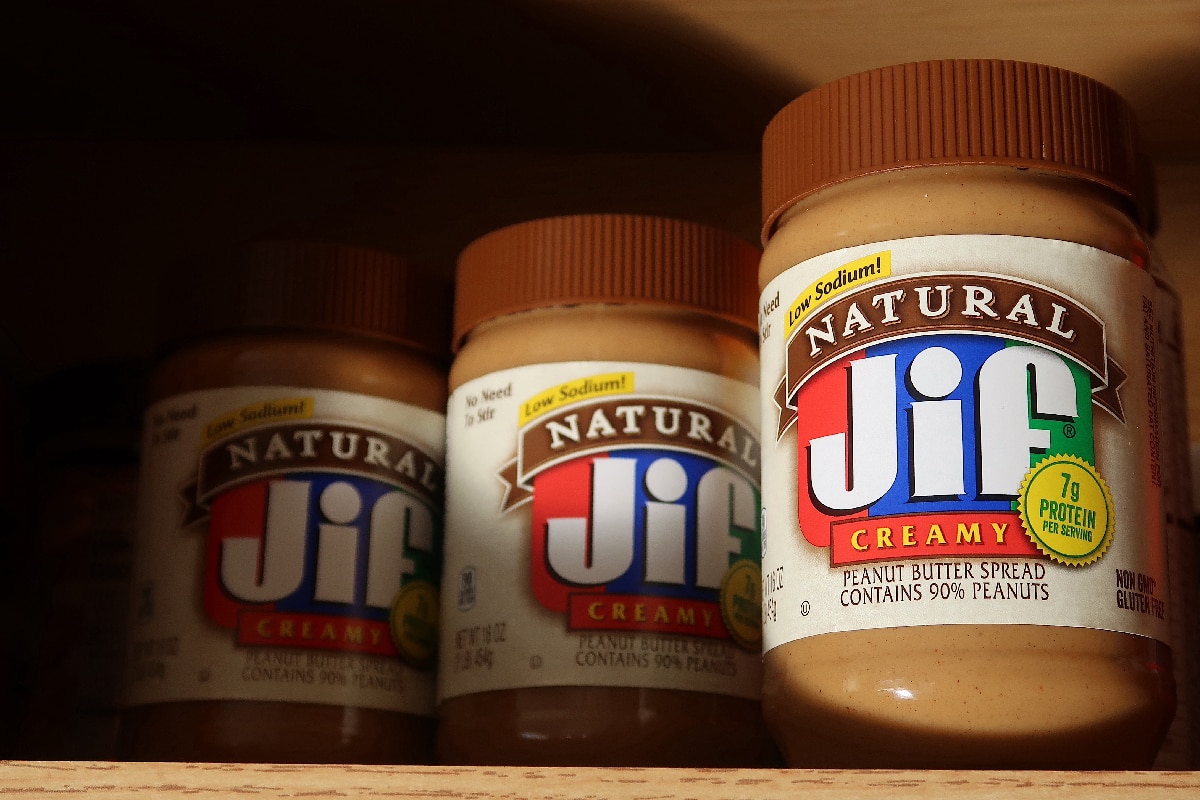
The type of peanut butter you buy is a matter of personal preference. Some people prefer natural peanut butter because it's made with only peanuts. Natural peanut butter is also usually lower in calories and fat than processed peanut butter.
Processed peanut butter, on the other hand, is made with additional ingredients such as sugar, salt, and vegetable oils. These ingredients help to improve the flavor and texture of the peanut butter. Processed peanut butter is also less likely to separate than natural peanut butter.
From a storage standpoint, both types can last for several months when stored properly. So, the choice is up to you.
Final Thoughts
When buying peanut butter, check the label to make sure you are storing it properly. Peanut butter can last for several months if stored properly, but it will go bad eventually. It's better to discard rancid peanut butter than to eat it and risk getting sick.
Made it to the end? Here are other articles you might find helpful:
Can I Use A Meat Grinder For Peanut Butter?
Sunflower Butter Vs Peanut Butter – How Do They Compare?
How To Store Peaches And Nectarines To Keep Them From Spoiling

